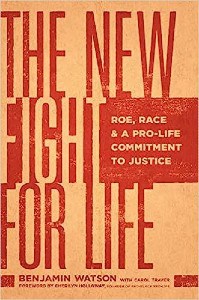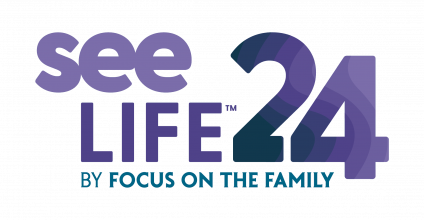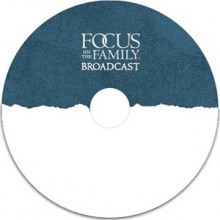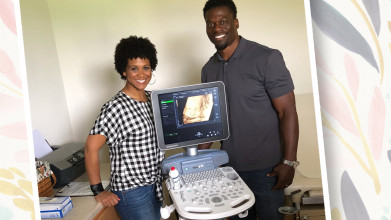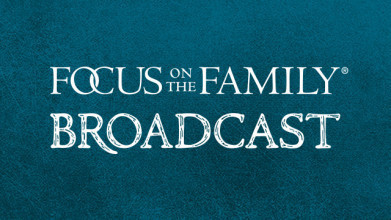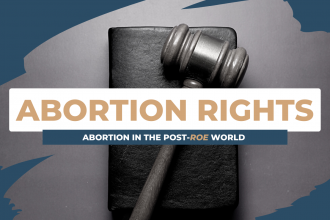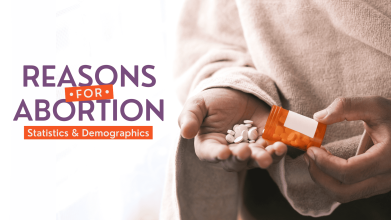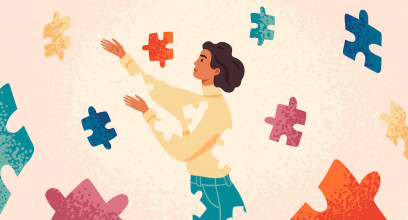Preview:
Benjamin Watson: And then we go into this room that had verses written all over the wall, and the mood was kind of somber, and wh-, as it was explained to us by the director of the pregnancy resource center, was that this room was a room where abortions were performed before. See, the building they were in, actually, the office space that they were in had been an abortion clinic at one time.
End of Preview
John Fuller: That’s former NFL player Benjamin Watson sharing about his time visiting a former abortion clinic that was converted to a pregnancy resource center, he’ll share many impactful stories and insights about doing what he can to make abortion unthinkable today on Focus on the Family. Your host is Focus president and author Jim Daly, and I’m John Fuller.
Jim Daly: John, this topic gets me, you know, riled up, the issue of, uh, taking innocent human life and the lack of wisdom that we seem to have in the culture about this. I mean, it, it, it, it’s just terrible. We’re so grateful for the Dobbs decision and the other positive directions that, uh, the culture seems to be tipping toward, but we got a long way to go. You know, most women who have an abortion or consider it are in extremely difficult circumstances. They find themselves in emotional turmoil and pain over what to do with this unexpected pregnancy. And, clearly, we believe that every human life matters as the Christian community, and that includes the woman and her baby, and as Christians, we’re called to show them love and practical help. In a recent gathering with some of our friends, uh, of Focus on the Family, Benjamin shared so many powerful truths about the role of men preventing abortion and standing for life after the overturning of the Roe versus Wade decision that the Supreme Court decided way back in 1973. Benjamin has such a heart for empathizing, uh, with pro-choice individuals and treating them with compassion and respect, even though, uh, he, and we, disagree with their position. I think that there’s a lot that we can learn from Benjamin in the compelling discussion we’re about to hear.
John: I’d agree, Jim, and, uh, Benjamin Watson serves as the Vice President of Strategic Relationships with the Human Coalition. That’s one of the largest pro-life, pro-woman organizations in the country. He recently wrote a book called The New Fight for Life: Roe, Race, and a Pro-Life Commitment to Justice, and that’ll form the basis of the conversation today. Jim, here’s how you began that discussion with Benjamin Watson at a live event in South Carolina on today’s episode of Focus on the Family.
Jim: Benjamin, it is so good to have you. I, I just love you (laughing). I love everything you stand for. You’re doing such a great job in so many areas. You played, uh, professional football in the NFL for 16 years. You come out of that. You and your wife are committed to the pro-life cause. You’ve written this great book, The New Fight for Life, and I’ve just been really amazed at your commitment. Tell me, where’s this coming from? Why do you have such a heart for the pre-born baby?
Benjamin: Yeah. Well, I appreciate, uh, you saying those things. I appreciate you. I appreciate you and Focus. We, we’ve talked about this before. I consider it a privilege any time I get an opportunity to speak with you and spend time with you and, and really to, uh, express to you and all those who support this ministry what it means, uh, to me personally. I mean, it means so much on a broad scale, but as I mentioned before, like I grew up like a Focus baby (laughing). I mean, my, my, my, my parents, you know, had all the material, and, and, and the things that you guys are involved with, um, has really been an encouragement me to me and my wife, so I appreciate that. A- as far as the pro-life stuff, it’s crazy. Played 16 years in the NFL and, uh, this was was never my … I never thought that I would write a book about the pro-life movement, about where we stand in the post-Roe world. That was not my goal. Uh, that was not on my radar. When we had our first child, Grace, Grace is 14 years old now, we went to go get a 3D/4D ultrasound and, if you’re familiar with those things, you can actually see like the baby in utero. And she was … Kir- Kirsten was beside me and I was sitting next to her, and the technician had put the, the, the picture on the screen, and I’m look at the picture of our daughter and she yawned. Like she actually-
Jim: And you could see it.
Benjamin: … she yawned, but then I yawned (laughing). Like I caught the yawn from the baby in utero. How crazy is that (laughing)? And so we left the place and Kirsten said, “You know, one day, I would,” this is our first child, she said, “One day, I would love to provide this service to other women. I think other women and, and men should be able to see their, their, their children.” And we just kind of sat on that, and then we had another child and, you know, then we had another child, had another 3D/4D ultrasound, and then we had another child and we had another 3D/4D ultrasound (laughing). And then we had another child, (laughing) and we had a 3D/4D ultrasound, and at that point, about eight or so years later, God provided an opportunity between Focus and E- ERLC with a joint venture to help provide ultrasounds to pregnancy resource centers. And that was, that wasn’t our on-ramp, so to speak, as far as caring about the value of life because, as believers, we understand that life begins at conception, that life has value from womb to tomb, that no matter your stage of development, no matter your ethnicity or no matter what part of the world you’re from, that there is value in the human person, in the human being, and we want to be committed to human flourishing, no matter what that looks like, um, f- for whoever you are. But, at that point, when I think you’re in the NFL and you purchase an ultrasound unit at a pregnancy resource center in Baltimore, Maryland, people took notice, and that allowed us to even speak on a broader scale-
Jim: Yeah.
Benjamin: … about the issue of life. And, you know, specifically, when it comes to being, being pro-life, uh, that was never, for us, a political banner or, uh, a tribe or a club. Again, we believe that simply as believers, as people who care about other people, that we want to serve others however we can.
Jim: What was your reaction to the overturning of Roe versus Wade, the Dobbs decision?
Benjamin: Almost was in a sta- state of shock. I was kind of in a state of awe, like I can’t believe this is actually happening, because I didn’t … even in speaking and in going around and in meeting with people that are in the pro-life movement, meeting with survivors of abortion, even when we were doing our documentary, I still found it hard to believe that, in America, where we stand now, Roe v. Wade would actually be overturned. And so, when it happened, there was a sense of shock, excitement, but also a sense of, um, wonder because I knew, for a lot of women and their pre-born children, the circumstances or the reasons why they thought abortion was the way to go didn’t change.
Jim: Hmm.
Benjamin: Like it’s imperative that the law is important. Overturning Roe was the right thing to do. In essence, it sent the issue back to the states. It was an egregious decision in the first place, should have never been made. For it to be sent back was the right thing to do. But, beyond that, I thought, “What about the woman who still thinks that abortion is necessary?” Uh, at Human Coalition, we have a stat, you know, I work for an organization called Human Coalition, and there’s this stat that 76% or abortion-determined women would prefer to parent if their circumstances were different.
Jim: Mm-hmm.
Benjamin: And, when you ask them, obviously, it’s, you know, relationship with, with the father, it’s those sorts of things, but it’s adequate housing and reliable housing. It’s, um, having an adequate wage, a livable wage. It’s things like education or … I mean, the list goes on. Those are the top things. And so, for them, they feel like, “Abortion is my only way to go,” and I thought to myself, “Okay, as pro-lifers, what does this mean in this new post-Roe era? What does this new fight for life look like, and how can we step into these areas in ways that perhaps that we didn’t see as a necessity before and didn’t quite know what to do?” because those issues are, are going to stay. And I also feel, Jim, that, at this point in time, when that happened, we better get ready-
Jim: Exactly.
Benjamin: … because the heat is going to turn up. It has turned up.
Jim: Talk about that heat a little bit. With that decision, those that oppose a pro-life position, you know, the pro-abortion side, quite a bit of violence is breaking out. Clinics are being set on fire. There’s, uh, you know, physical violence going on.
Benjamin: Yeah.
Jim: I, I know we had a couple of Supreme Court justices who were threatened. Uh, Brett Kavanaugh’s family, the, the, they arrested somebody who was on his way to try to assassinate him.
Benjamin: Yeah.
Jim: Uh, speak to that environment change. It seems like there’s a lot of aggression on this issue.
Benjamin: Yeah. Th- th- there is, and, and a lot of that started happening when the leak happened, (laughing) if you can remember.
Jim: Yeah.
Benjamin: When the leak happened, that’s when, uh, a lot of that stuff started happening. A very wise friend of mine once told me not to judge either side of any issue by their loudest activist.
Jim: That’s good.
Benjamin: And he, and he warned me, because we do live in a culture and a time, especially with social media, which I’m guilty of, where it’s very easy to get entrenched and to see an entire side as their loudest, most outlandish activist.
Jim: That’s called cable news (laughing).
Benjamin: Exactly, exactly.
Jim: Yeah.
Benjamin: And, and, and it, and it feeds it, so while we do have to acknowledge the violence and condemn it, we also have to realize that the larger issue isn’t even those people, Jim, who are going and, you know, having, enacting violence at clinics or the people who are threatening the Supreme Court jus- … those people need to be dealt with for sure. But the more insidious part that we need to address are those who believe that abortion is a viable and celebrated option, th- those who don’t quite agree or understand that human life begins at conception, and it’s valuable even with a pre-born child. Tho- those are the people … uh, uh, the folks that we need to address is a culture that is devaluing human life, not just on the issue of abortion, but on so many other issues.
Jim: Yeah.
Benjamin: And, and some of what I talk about in the book is, you know, when I talk about justice, and the Bible talks so much about justice. Um, Tim Keller, who … a powerful man of, of God, uh, one of, one of my favorite books that he wrote is called Generous Justice. And, in the book, he talks so much about what the Bible says about what justice is. Justice is a word that gets thrown around a lot (laughs). It can mean a lot of different things to a lot of different people, but he talks about these two words in Scripture that mean kind of righteousness and justice and how those two words are married together so often in the Book of Psalms, in the Book of Micah, in the Book of Amos, and, and, uh, and throughout Scripture, James, I mean, different places where the, the word turns up and how we, as people who love life and who, who understand the value of life, should be people of justice. And, and part of the, the reason for even writing the book was to challenge those in the pro-life movement to see the value of justice in addressing those women and their communities, to see the value of, uh, of justice, meaning creating wholeness and bringing people back into, as much as we can on this side of Heaven, into a right and whole relationship with the Creator, like, l- l- l- like fixing the, the walls of hostility and, and redressing where things have gone wrong and how those sorts of things provide opportunities for life.
Jim: Yeah. 2019, we did an event in New York. Uh, I, I coined it Alive From New York-
Benjamin: It was so good. It was so good.
Jim: … a little spin on Saturday Night (laughs) Live-
Benjamin: Yeah.
Jim: … Alive From New York. Uh, and what was amazing, uh, we had, I think it was you, but one of the early speakers, uh, said more Black babies died due to abortion in New York than were born last year. That was a true statement, and that made a huge impact, even with the protestors who were there, ’cause, uh, Black Lives Matter and LGBTQ folks were there protesting Focus on the Family.
Benjamin: Yeah.
Jim: Kind of it goes out through social media and they show up.
Benjamin: Yeah.
Jim: But the Black Lives Matter folk who were holding signs dropped the signs and came in with the group. I thought that was pretty powerful.
Benjamin: Yeah. It was, (laughs), it was … matter of fact, (laughs) so probably about two weeks ago, my son was doing this like … he wants to play football so badly (laughing). I’m going somewhere with this. Uh, he wants to play football so badly and, and me and Kirsten are like, “Uh, you need to be a lot older. We know what football does. No shade to any parent that wants to do it, but we want you to be a little bit older.” Anyway, we allowed him to do this like two-week thing, this camp, at his school, and this guy walks up to me, Jim. I don’t know him from Adam. He walks up to me and says, “Man, I thought that was you. I was in New York at Alive New York.” This is in Georgia.
Jim: Okay.
Benjamin: He said, “I was at Alive New York. I brought my son. We were living in Oklahoma. I brought my son all the way to New York just to see that.”
Jim: Wow.
Benjamin: And so we had a conversation. So what you did there and what you planned is still having reverberations.
Jim: That’s awesome.
Benjamin: So, first of all, I want to say that. But, second of all, that was a true stat at that point. Luckily, when it comes to Black abortions in New York City, that is not the truth anymore.
Jim: That’s fantastic.
Benjamin: That, that has changed. But, but I think what you saw there was people coming face to face with the realities of abortion and coming face to face with how devastating it is. Uh, as I’ve gone around in pro-life circles, one of the stats that always sticks with me was that Black women were three to four times more likely than their white counterparts and they lead any other ethnic group when it comes to the issue of abortion. Uh, and the reason why, it, it kind of unsettles me, is because, usually, the conversation stops there. There’s never the why, and I like to ask why? Like people never say it’s because Black women and men like killing their children, or the other opportunity or the other option in my, the way I think is what is it about this demographic that makes them more vulnerable to this decision? And some of what I even do in the book is I talk a little bit about the history when it comes to race in this country. You and I have talked about race before and we had some great conversations, where you said, “Ah, is that really true?” It was like, “Yeah, well, this …” and we’ve pushed back, which is great.
Jim: Yeah.
Benjamin: That’s what brothers are supposed to do-
Jim: Yeah.
Benjamin: … in Christ, understand these sorts of things. But I, I talk about, specifically for Black women, how their lives have been devalued in so many different ways, whether it’s by medicine, where many of them aren’t treated equally, whether it’s in wages, where they earn 38% of their white male, male counterparts, even though they have the same education, uh, when it comes to, you know, educational opportunities, those sorts of things. When it comes to real legal and laws that have been passed by this country, how has that impacted this community to possibly make them more vulnerable? There’s a stat, another stat, that goes around and talks about Planned Parenthood and how they target, and they do, through advertising, through funds. Planned Parenthood is a 633 million … they got $633 million from the government in 2021. They are a $2.1 billion industry, abortion industry, largely off the backs of the Black community. And so, when I look at them and I think about the history of eugenics in this country, I can’t help but draw conclusions about race in this country, but I can also say that Planned Parenthood is smart. They will go where there’s fish. Why are those fish there? Some of the things I talk about in the book.
Jim: And those are the economic issues and-
Benjamin: Yes.
Jim: … things that culture should take a look at-
Benjamin: Yeah.
Jim: … and how to address them, and, and, uh, you, you have written about that in several books and-
Benjamin: Yeah.
Jim: … I think it’s really important for us to have those dialogues and to talk those things through. Let me ask you-
Benjamin: Espe- especially in the church.
Jim: Yeah.
Benjamin: Especially in the church-
Jim: Yeah.
Benjamin: … because, you know, the, the church … a lot of times, we look at the issue of abortion as something out there, and quite honestly, even in this room, with 60 or so professed believers, four in 10 women around, in the church, have had abortions.
Jim: Yeah. Yeah.
Benjamin: And so it’s not something that’s out there. Like it’s something in here. It, it’s something in the body that we have, that we have to deal with, and a lot of times, we don’t talk about it ’cause it’s so painful, as it should be. Any time you’re talking about life, Jim, it’s painful to deal with, but how are we, as a body of believers, going to repair and pull off the condemnation because there is none in Christ Jesus? How are we going to reunite families and how are we going to take some of these women’s pain and turn it into their purpose and their mission if we, as Christians, don’t want to talk about it and we’re scared to deal with it?
Jim: No, that’s really good, and, and the other interesting stat around this is that, uh, if a pregnant woman, an abortion-minded woman, has a person in her corner, hopefully, the boyfriend or the husband-
Benjamin: Yeah.
Jim: … specifically, the boyfriend or the husband, if he’s more supportive, it’s more likely a majority of those women, abortion-minded women, will have their child.
Benjamin: 100%.
Jim: And so men play a role-
Benjamin: A huge role.
Jim: … even though we’re told, you know, “You can’t talk about this because you’re a man. You’re not a woman.”
Benjamin: Yeah, “You don’t have a uterus.”
Jim: Now you and I are both men, obviously (laughing). Right.
Benjamin: No, it’s actually … (laughing).
Jim: So, I mean, so in that-
Benjamin: Yeah.
Jim: … in, with that criticism, how do you respond as a man, to say, yeah, I’m a pro-life leader-
Benjamin: Yeah.
Jim: … and it’s important for me as a man to be involved in this? It, this isn’t just a woman’s issue.
Benjamin: Yeah. Th- th- that is one of the lies of the enemy, and the thief comes to steal and kill and to destroy. He also comes to confuse. And, unfortunately, for many men, we’ve used abortion as a get-out-of-jail-free card. We have to come to grips with that. We’ve used abortion as a shield to hide and to, um, absolve ourselves of any r- responsibility or guilt. We have to come to grips with that and be honest about that. The enemy uses that line about, “You’re a man, you can’t be involved,” as a way to confuse and deflect from the real issue. I mean, let’s, let’s be matter of fact about it. I have seven children. Each of them has 46 chromosomes. They got 23 from me and 23 from their mom. Whether we like it or not, I’m involved.
Jim: Yeah, right (laughs).
Benjamin: Whether we like it or not, I have a place at the table. And what the enemy does, and what so many folks who are influenced by the enemy do, is to try to draw a man out of the equation because that’s when disorder sets in. Now, whether the man is drawn out by circumstances that he can’t control … you know, th- there are a lot of men who, who are not there. They want to be there, but they can’t be because something has happened to them that may be unjust, why they’re not there, and we have to deal with that. But my point is, in, in agreeance with you, is that men play a huge role. There are many men that are suffering that are post-abortive men who actually were a part of an abortion. And what I would say, but not what I would say, but what the Lord would say to you is that there is forgiveness. He would also say that there’s, that there’s redemption, and He would also say that, within our failings, many times, that can be the greatest force for good-
Jim: Yeah.
Benjamin: … when we get over those sorts of things.
Jim: Boy, it’s so good. Let me go back to Baltimore, uh, because that story is so powerful. You and Kirsten, your wife, got involved. That was the first ultrasound machine that you sponsored.
Benjamin: Yeah.
Jim: But speak to the story, because it has … I mean, it’s just great in every direction.
Benjamin: Yeah. Well, it, it’s basically people doing what they can do, and a lot of times, folks feel like problems are just too big, “This is beyond me. There’s nothing I can do.” And I, I had a real famous coach who said, “Do your job (laughs).” His name was Bill Belichick. He would scream it at us, “Do your job and do it well.” And, at that point in time, we were just doing, we were doing our job, you know, we were doing what God called us to do. And the ultrasound, as you know, is one of the centerpieces of a resource center. For those that don’t know, there are 2700 pregnancy resource centers around the county, and so these centers provide, uh, direct services, whether they are, um, counseling, first of all, or, or whether they’re materials, baby needs, those sorts of things.
Jim: Mm-hmm.
Benjamin: Some of them even offer educational classes, whatever a mom may need. There are 2700 of those around the country. And the ultrasound, a lot of times, is the primary piece in there because, when a woman, when … if she can get her husband or her boyfriend into there, into the clinic, sees the child in utero, it’s amazing how things change. Th- that’s why they don’t want you to see those so- sorts of things at an abortion clinic.
Jim: Right, ’cause it’s a baby.
Benjamin: Exactly. Because, all of a sudden, you see a heartbeat, you hear a heartbeat, you see a child, it changes things. And so we donated this ultrasound, and what was crazy, the place that we donated the ultrasound to, we went to go visit when it was kind of commissioned, and so Kirsten and I went. It was in Severna Park, Maryland, which is a suburb of Baltimore. I was playing for the Ravens at the time, and, uh, we go there and go into this, uh, office building where the pregnancy resource center was, and they showed us around. They had a couple people who, a couple women who had gone to the clinic and had kept their children, those sorts of things, and so it was just, just … we got to meet the staff and all that type of stuff. And then we go into this room that had verses written all over the wall, and the mood was kind of, kind of somber, and wh-, as it was explained to us by the director of the pregnancy resource center, was that this room was a room where abortions were performed before. See, the building they were in, actually, the office space that they were in had been an abortion clinic at one time. And, in some strange twist of irony, some women still come to that office space seeking an abortion, but, instead, encounter life. And, in that room, when they get depressed and upset, um, and, and it gets heavy. You know, dealing with these … be- because everybody doesn’t choose life and, and God gives us choice. Everybody doesn’t choose life. Some people walk out and they still get an abortion, and it gets heavy. And, and when that happens, some of the workers there go into that room, and covered on the floor is … it’s a blood-stained floor that’s covered by a carpet, and there’s verses all around. They go in there and they pray and they reflect and they get rejuvenated and they realize that they have to keep on going.
Jim: Yeah. That’s … no, it’s so true and I’m so grateful to you for this wonderful book, The New Fight for Life, and you have so much insight. You know, so many people would say, “Well, you’re just a football player.” You’re so much more than that, and the Lord is using you, thanks to your dad. Yeah. And-
Audience: (Clapping)
Benjamin: Yes, yep. Thank you. Thank you. Yeah.
Jim: … I think it’s just, it’s so good to see a leader lead and to be out there and to take and to listen and to then give wisdom back. That sounds like somebody I know about in Scripture (laughing). Oh, Jesus, (laughing) that’s kind of what he did, right?
Benjamin: Exactly.
Jim: He listened to people, He heard people-
Benjamin: Yeah.
Jim: … and then He told them truth.
Benjamin: Yeah.
Jim: And you do that so wonderfully. You really model that well.
Audience: (Clapping)
John: Benjamin Watson on today’s episode of Focus on the Family, and, uh, that was recently recorded in South Carolina in front of some Focus on the Family friends. Benjamin has so much to say about this matter, about protecting the pre-born and about looking after their mothers. He has a new book called The New Fight for Life: Roe, Race, and a Pro-Life Commitment to Justice.
Jim: Uh, Benjamin Watson has some really good insights for us to consider as we seek to represent Christ in a respectful and caring way, and that should be the goal. He and his organization are doing such incredible work to help women and their pre-born children who are the most vulnerable in the culture. We also need to show compassion for those who’ve had an abortion in their past. Our words and actions can literally change their lives through the power of Christ, and that’s what you’re going to hear. And I want to ask you, will you stand with Focus on the Family to honor every human life? Your gift will make an impact like it did for Distara, who had abortions as a form of birth control, which is not unusual, until she heard the Focus broadcast.
Distara: Today, you know, I, I’m knowing the truth. Focus on the Family has been a major part of my life, but they did a teaching on abortion and that it was murder. So everything throughout the years, it just came to light and it was confirmation, and I was like, “Wow.” So I was even more tuned in like because I wanted to hear more of what Focus on the Family could teach me. Now, today, (laughs) I am married to Patrick Seymour, and this is Prestige, (laughs) and he was born a day after Thanksgiving, which is a lot to be thankful for, and I’m grateful and honored that Abba forgave me and still trusts me to be a mommy, ’cause I love being a mommy. It’s the greatest gift ever.
Jim: This is incredible. Folks, you can make a difference. Let me encourage you to support us with a monthly gift to help women like Distara and many, many others. If you’re unable to support us monthly, please consider a one-time gift. Step into ministry with us here at Focus on the Family and be part of the solution. For a gift of any amount, we’ll send you Benjamin Watson’s great book, The New Fight for Life, and it unpacks many issues surrounding abortion and offers some new perspectives.
John: Yeah, and you can donate today when you call 800, the letter A, and the word FAMILY, 800-232-6459, or donate online and request that book at focusonthefamily.com/broadcast.
Jim: And, and, John, one final thing as we close, uh, you, the listener, can hear a lot more from Benjamin Watson on pro-life issues in my podcast. It’s called ReFOCUS with Jim Daly, and you can hear the extended conversation, including a good, solid, lengthy Q&A with the audience.
John: Yeah, check out Jim’s podcast, ReFOCUS with Jim Daly. We’ve got details at focusonthefamily.com/broadcast. And, on behalf of Jim Daly and the entire team, thanks for listening today to Focus on the Family. I’m John Fuller inviting you back as we, once again, help you and your family thrive in Christ.












